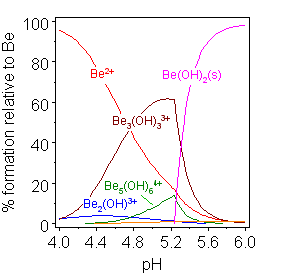Beryllium
(Redirected from Glucinum)
Beryllium is a chemical element with the symbol Be and atomic number 4. It is a relatively rare element in the universe, usually occurring as a product of the spallation of larger atomic nuclei that have collided with cosmic rays. Within the crust of the Earth, beryllium is found somewhat more abundantly, though it is ranked as the 44th most abundant element. It is a divalent element that occurs naturally only in combination with other elements in minerals. Notable gemstones which contain beryllium include beryl and emerald.
Properties[edit | edit source]
Beryllium is a steel-gray, strong, lightweight, and brittle alkaline earth metal. It is a relatively rare element in both the solar system and the Earth's crust. Beryllium has one of the highest melting points of the light metals: 1287°C (2349°F). Its modulus of elasticity is about one-third greater than that of steel. It has excellent thermal conductivity, is nonmagnetic, and resists acid corrosion. When beryllium is exposed to air, it forms an oxide layer that protects the metal from further oxidation at ordinary temperatures.
Applications[edit | edit source]
Due to its unique properties, beryllium is used in a variety of applications. It is a critical material in aerospace, defense, and nuclear industries because of its light weight, high melting point, and excellent thermal stability. Beryllium is used in the manufacture of aircraft, missiles, spacecraft, and satellites. Its ability to slow neutrons makes it useful as a reflector and moderator in nuclear reactors. Beryllium is also used in the production of professional audio equipment, precision instruments, and computer parts, owing to its stiffness, nonmagnetic properties, and stability over a wide temperature range.
Health Hazards[edit | edit source]
Beryllium is toxic and exposure to it can cause a chronic life-threatening allergic disease called berylliosis or chronic beryllium disease (CBD). The disease affects the lungs and can cause shortness of breath, cough, fatigue, weight loss, and, in severe cases, death. Beryllium's toxicity requires strict safety precautions when handling materials containing beryllium. Occupational safety and health regulations mandate limiting exposure to beryllium in the workplace.
Occurrence[edit | edit source]
Beryllium is found in about 30 mineral species, the most important of which are beryl (Be3Al2(SiO3)6) and bertrandite (Be4Si2O7(OH)2). Commercial production of beryllium generally involves the reduction of beryllium fluoride with magnesium metal. The largest producers of beryllium in the world include the United States, China, and Kazakhstan.
Environmental Impact[edit | edit source]
While beryllium is not considered a major environmental contaminant, its mining and processing can lead to the release of toxic dusts that can harm human health. The production and use of beryllium must be carefully managed to minimize exposure to beryllium dust and particles.
See Also[edit | edit source]
Navigation: Wellness - Encyclopedia - Health topics - Disease Index - Drugs - World Directory - Gray's Anatomy - Keto diet - Recipes
Search WikiMD
Ad.Tired of being Overweight? Try W8MD's physician weight loss program.
Semaglutide (Ozempic / Wegovy and Tirzepatide (Mounjaro) available.
Advertise on WikiMD
WikiMD is not a substitute for professional medical advice. See full disclaimer.
Credits:Most images are courtesy of Wikimedia commons, and templates Wikipedia, licensed under CC BY SA or similar.Contributors: Admin, Prab R. Tumpati, MD





